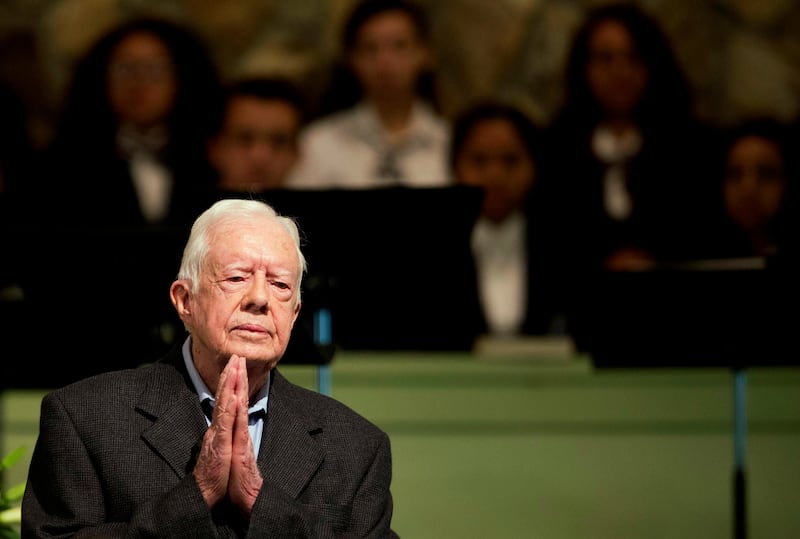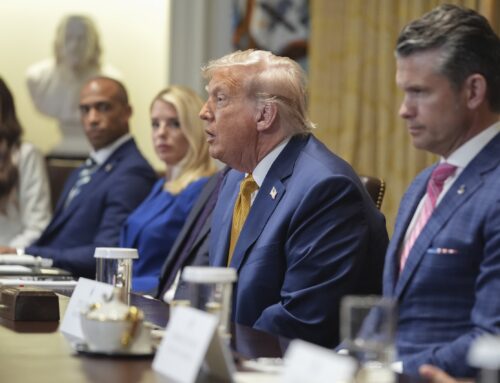Perspective: Jimmy Carter was the best of us
January 6, 2025
As the nation continues to reflect on the extraordinary life and legacy of Jimmy Carter, who passed away Dec. 29 at the age of 100, many have unfortunately chosen to fixate on a single descriptive: one-term president.
While this framing is factual, it fails to capture the profound impact of Carter’s extraordinary life — a legacy of service and decency that was grounded in his Christian faith and extended far beyond the bounds of his time in politics to touch untold millions of lives.
Put simply, no matter how many votes he received when he lost to Ronald Reagan in 1980, Carter represented the very best that America has to offer. A man of deep faith, unwavering morality and profound humility until his final days, he was never focused on the pursuit of political power for its own sake, but on using every tool at his disposal to serve and improve the lives of others.
For the 50 years, Carter’s principled approach to public life has stood as a beacon of selflessness in a world increasingly dominated by self-interest. And now, as the country prepares to lay him to rest in formal ceremonies this week, his life offers a powerful reminder of the model of leadership that Americans across the partisan spectrum have revered since our founding — and a poignant lesson on how far we’ve strayed from that path.
A life of purpose
Carter’s moral compass was evident long before he ascended to the presidency. Born in Plains, Georgia, in 1924, he grew up in a modest environment that instilled in him a deep sense of community. His devout Baptist upbringing and lifelong devotion to Christian principles shaped his approach to life and leadership, emphasizing the importance of compassion, humility and justice.
Following his surprise election as our nation’s 39th president in 1976, Carter sought to bring those same values to the White House in the aftermath of the Watergate scandal, with admittedly uneven results.
To be sure, there were significant accomplishments. Carter successfully brokered the Camp David Accords, the peace agreement between Egypt and Israel that remains one of the most significant diplomatic achievements in modern history. He made human rights a cornerstone of his foreign policy, an approach that often put him at odds with Cold War pragmatism but underscored his commitment to moral leadership. And domestically, he championed energy conservation and environmental protection, recognizing the pressing need for sustainable stewardship of our planet long before it became a popular political rallying cry.
On the other hand, Carter’s presidency was hamstrung by a string of challenges at home and abroad, including a crippling energy shortage, persistent high inflation and the Iran hostage crisis. Compounding on one another, these problems proved to be too much for Carter to overcome, ultimately leading to his lopsided defeat after a single term in the Oval Office.

But to define Carter’s legacy purely by these political challenges would miss the essence of who he was — something that he continued to showcase long after he left the halls of power and returned to his peanut farm in rural Georgia.
In fact, most of Carter’s greatest achievements came after he left the White House. Many politicians fade from public life after electoral defeat, content to retire on their laurels and maybe cash a few big checks after years on a government salary. Not Jimmy Carter. More than any president before or since, he used his post-presidency years to amplify his impact, dedicating the remainder of his life to using whatever influence he still possessed to advance the same goals he’d pursued during his political career: fighting poverty, promoting peace and eradicating disease.
In 1982, he and his wife, Rosalynn, cofounded the Carter Center, an organization that has strengthened elections in fragile democracies, brokered peace deals between nations and spearheaded efforts to eliminate Guinea worm disease, a parasitic affliction that once plagued tens of millions around the globe. Today, cases have dwindled to fewer than a dozen, thanks in large part to Carter’s commitment — a mammoth achievement for humanity that contributed to Carter winning the Nobel Peace Prize in 2002.
Through it all, he remained firmly connected to his roots. Even in his 90s, Carter regularly taught Sunday school at Maranatha Baptist Church in his hometown of Plains, welcoming visitors from around the world who sought his wisdom and warmth. His humility was not performative; it was authentic, a natural extension of his abiding commitment to the gospel of Jesus Christ.
Our nation has seen countless prominent Christian political leaders over the years, ranging from the deeply devout to the politically convenient — but you would be hard-pressed to find one whose life has embodied the teachings of the Master more completely than Jimmy Carter. He was the ultimate example of what true faith looks like when put wholeheartedly into action.
A time for reflection
Carter’s life and legacy feel particularly resonant in our current political climate, where humility and moral conviction often take a backseat to ambition and partisanship. His approach to leadership — putting principle over politics and service over self — stands in stark contrast to the divisiveness and cynicism that now dominate the national discourse.
As I write, America is weeks away from witnessing the transition of power back to a leader whose values could not be more different from Carter’s. But this is not a one-person problem. The moral and ethical decay in our politics has pushed many good people out of public life, leaving a void where moral leaders like Carter once stood. The result is a political landscape that too often rewards bombast over substance and expedience over integrity.
Make no mistake: This is not a lament for some imagined golden age of politics. Carter’s era was not without its challenges and divisions. But his example shows that it is possible to navigate challenges with integrity and compassion. Carter may not have secured a second term, but he achieved something far more enduring: a legacy of goodness and service that transcends the temporal bounds of political office. And his passing presents an opportunity for shared introspection: What kind of leaders do we want to guide us? What values should define our politics and our national identity? And what does that say about what kind of country we aspire to be?
Carter’s life offers a clear answer. He showed us that leadership is not about accruing power for personal benefit but about using it to make life better for others. He demonstrated that faith, when lived authentically, can be a force for good — a source of unity rather than division. And he proved that humility and strength are not mutually exclusive but are, in fact, complementary qualities of true greatness.
As we navigate an era of profound political and social challenges, we would do well to remember Carter’s example. His life was a testament to the power of moral conviction and the enduring impact of a servant’s heart. It challenges us to demand more from our leaders — and from ourselves.
Steve Pierce, a contributing writer for Deseret, is a Democratic strategist and communications consultant who advises campaigns, causes and brands on matters of message and strategy. He is a senior director at Bully Pulpit International, a communications firm based in Washington, D.C.
Search
RECENT PRESS RELEASES
Related Post




View Comments